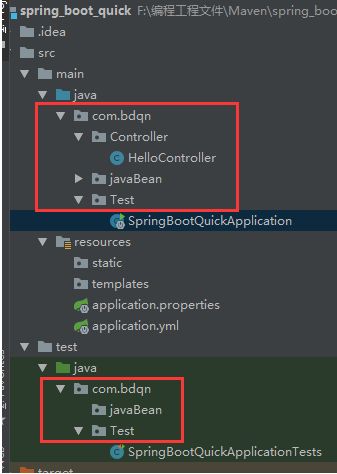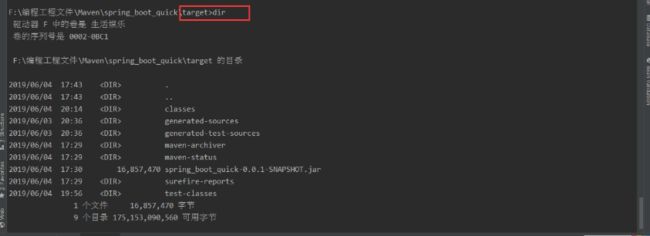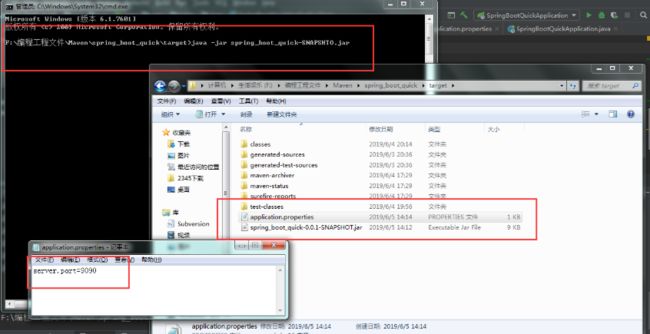springboot---配置文件
目录
- 1. 概述
- 2. 常见配置字段
- 3. 配置文件详解
-
- 3.1. application.properties
-
- 3.1.1.普通maven项目
- 3.1.2. springboot项目
- 3.2. application.yml
- 3.3. yml和properties共存
- 3.4. 配置文件的位置
- 3.5. 获取配置属性
- 3.6. 配置文件值注入
- 3.7. 外部配置加载顺序
- 3.8. 自动配置原理
1. 概述
SpringBoot 是基于约定的,所以很多配置都有默认值,但如果想使用自己的配置替换默认配置的话,就需要添加配置文件。
在 Spring Boot 中,配置文件有两种不同的格式,一个是 application.properties 另一个是 application.yml 或 application.yaml。
properties 文件比较常见,因为不止是springboot中会使用,普通maven项目也是可以使用的,只是读取方式不同。相对于 properties 而言,yaml 更加简洁明了,而且使用的场景也更多,很多开源项目都是使用 yaml 进行配置。除了简洁,yaml 还有另外一个特点,就是 yaml 中的数据是有序的,properties 中的数据是无序的,在一些需要路径匹配的配置中,顺序就显得尤为重要,因此 Spring Boot 中我们一般采用 yaml。SpringBoot 默认会从 resources 目录下加载 application.properties 或 application.yml(application.yaml) 文件,所以 SpringBoot 项目中一般将配置文件放到 resources 中。
2. 常见配置字段
#############################################################
# mvc
#############################################################
spring.mvc.async.request-timeout=设定async请求的超时时间,以毫秒为单位,如果没有设置的话,以具体实现的超时时间为准,比如tomcat的servlet3的话是10秒.
spring.mvc.date-format=设定日期的格式,比如dd/MM/yyyy.
spring.mvc.favicon.enabled=是否支持favicon.ico,默认为:=true
spring.mvc.ignore-default-model-on-redirect=在重定向时是否忽略默认model的内容,默认为true
spring.mvc.locale=指定使用的Locale.
spring.mvc.message-codes-resolver-format=指定message=codes的格式化策略(PREFIX_ERROR_CODE,POSTFIX_ERROR_CODE).
spring.mvc.view.prefix=指定mvc视图的前缀.
spring.mvc.view.suffix=指定mvc视图的后缀.
#############################################################
# messages
#############################################################
spring.messages.basename=指定message的basename,多个以逗号分隔,如果不加包名的话,默认从classpath路径开始,默认:=messages
spring.messages.cache-seconds=设定加载的资源文件缓存失效时间,-1的话为永不过期,默认为-1
spring.messages.encoding=设定Message=bundles的编码,默认:=UTF-8
#############################################################
# mobile
#############################################################
spring.mobile.devicedelegatingviewresolver.enable-fallback=是否支持fallback的解决方案,默认false
spring.mobile.devicedelegatingviewresolver.enabled=是否开始device=view=resolver,默认为:=false
spring.mobile.devicedelegatingviewresolver.mobile-prefix=设定mobile端视图的前缀,默认为:mobile/
spring.mobile.devicedelegatingviewresolver.mobile-suffix=设定mobile视图的后缀
spring.mobile.devicedelegatingviewresolver.normal-prefix=设定普通设备的视图前缀
spring.mobile.devicedelegatingviewresolver.normal-suffix=设定普通设备视图的后缀
spring.mobile.devicedelegatingviewresolver.tablet-prefix=设定平板设备视图前缀,默认:tablet/
spring.mobile.devicedelegatingviewresolver.tablet-suffix=设定平板设备视图后缀.
spring.mobile.sitepreference.enabled=是否启用SitePreferenceHandler,默认为: true
#############################################################
# view
#############################################################
spring.view.prefix=设定mvc视图的前缀.
spring.view.suffix=设定mvc视图的后缀.
#############################################################
# resource
#############################################################
spring.resources.add-mappings=是否开启默认的资源处理,默认为true
spring.resources.cache-period=设定资源的缓存时效,以秒为单位.
spring.resources.chain.cache=是否开启缓存,默认为:=true
spring.resources.chain.enabled=是否开启资源=handling=chain,默认为false
spring.resources.chain.html-application-cache=是否开启h5应用的cache=manifest重写,默认为:=false
spring.resources.chain.strategy.content.enabled=是否开启内容版本策略,默认为false
spring.resources.chain.strategy.content.paths=指定要应用的版本的路径,多个以逗号分隔,默认为:[/ **]
spring.resources.chain.strategy.fixed.enabled=是否开启固定的版本策略,默认为false
spring.resources.chain.strategy.fixed.paths=指定要应用版本策略的路径,多个以逗号分隔
spring.resources.chain.strategy.fixed.version=指定版本策略使用的版本号
spring.resources.static-locations=指定静态资源路径,默认为classpath:[/META-INF/resources/,/resources/, /static/, /public/]以及context:/
#############################################################
# multipart
#############################################################
multipart.enabled=是否开启文件上传支持,默认为true
multipart.file-size-threshold=设定文件写入磁盘的阈值,单位为MB或KB,默认为0
multipart.location=指定文件上传路径.
multipart.max-file-size=指定文件大小最大值,默认1MB
multipart.max-request-size=指定每次请求的最大值,默认为10MB
#############################################################
# freemarker
#############################################################
spring.freemarker.allow-request-override=指定HttpServletRequest的属性是否可以覆盖controller的model的同名项
spring.freemarker.allow-session-override=指定HttpSession的属性是否可以覆盖controller的model的同名项
spring.freemarker.cache=是否开启template caching.
spring.freemarker.charset=设定Template的编码.
spring.freemarker.check-template-location=是否检查templates路径是否存在.
spring.freemarker.content-type=设定Content-Type.
spring.freemarker.enabled=是否允许mvc使用freemarker.
spring.freemarker.expose-request-attributes=设定所有request的属性在merge到模板的时候,是否要都添加到model中.
spring.freemarker.expose-session-attributes=设定所有HttpSession的属性在merge到模板的时候,是否要都添加到model中.
spring.freemarker.expose-spring-macro-helpers=设定是否以springMacroRequestContext的形式暴露RequestContext给Spring’s macro library使用
spring.freemarker.prefer-file-system-access=是否优先从文件系统加载template,以支持热加载,默认为true
spring.freemarker.prefix=设定freemarker模板的前缀.
spring.freemarker.request-context-attribute=指定RequestContext属性的名.
spring.freemarker.settings=设定FreeMarker keys.
spring.freemarker.suffix=设定模板的后缀.
spring.freemarker.template-loader-path=设定模板的加载路径,多个以逗号分隔,默认: [“classpath:/templates/”]
spring.freemarker.view-names=指定使用模板的视图列表.
#############################################################
# velocity
#############################################################
spring.velocity.allow-request-override=指定HttpServletRequest的属性是否可以覆盖controller的model的同名项
spring.velocity.allow-session-override=指定HttpSession的属性是否可以覆盖controller的model的同名项
spring.velocity.cache=是否开启模板缓存
spring.velocity.charset=设定模板编码
spring.velocity.check-template-location=是否检查模板路径是否存在.
spring.velocity.content-type=设定ContentType的值
spring.velocity.date-tool-attribute=设定暴露给velocity上下文使用的DateTool的名
spring.velocity.enabled=设定是否允许mvc使用velocity
spring.velocity.expose-request-attributes=是否在merge模板的时候,将request属性都添加到model中
spring.velocity.expose-session-attributes=是否在merge模板的时候,将HttpSession属性都添加到model中
spring.velocity.expose-spring-macro-helpers=设定是否以springMacroRequestContext的名来暴露RequestContext给Spring’s macro类库使用
spring.velocity.number-tool-attribute=设定暴露给velocity上下文的NumberTool的名
spring.velocity.prefer-file-system-access=是否优先从文件系统加载模板以支持热加载,默认为true
spring.velocity.prefix=设定velocity模板的前缀.
spring.velocity.properties=设置velocity的额外属性.
spring.velocity.request-context-attribute=设定RequestContext attribute的名.
spring.velocity.resource-loader-path=设定模板路径,默认为: classpath:/templates/
spring.velocity.suffix=设定velocity模板的后缀.
spring.velocity.toolbox-config-location=设定Velocity Toolbox配置文件的路径,比如 /WEB-INF/toolbox.xml.
spring.velocity.view-names=设定需要解析的视图名称.
#############################################################
# thymeleaf
#############################################################
spring.thymeleaf.cache=是否开启模板缓存,默认true
spring.thymeleaf.check-template-location=是否检查模板路径是否存在,默认true
spring.thymeleaf.content-type=指定Content-Type,默认为: text/html
spring.thymeleaf.enabled=是否允许MVC使用Thymeleaf,默认为: true
spring.thymeleaf.encoding=指定模板的编码,默认为: UTF-8
spring.thymeleaf.excluded-view-names=指定不使用模板的视图名称,多个以逗号分隔.
spring.thymeleaf.mode 指定模板的模式,具体查看StandardTemplateModeHandlers,默认为: HTML5
spring.thymeleaf.prefix=指定模板的前缀,默认为:classpath:/templates/
spring.thymeleaf.suffix 指定模板的后缀,默认为:.html
spring.thymeleaf.template-resolver-order=指定模板的解析顺序,默认为第一个.
spring.thymeleaf.view-names=指定使用模板的视图名,多个以逗号分隔.
#############################################################
# mustcache
#############################################################
spring.mustache.cache=是否Enable template caching.
spring.mustache.charset=指定Template的编码.
spring.mustache.check-template-location=是否检查默认的路径是否存在.
spring.mustache.content-type=指定Content-Type.
spring.mustache.enabled=是否开启mustcache的模板支持.
spring.mustache.prefix=指定模板的前缀,默认: classpath:/templates/
spring.mustache.suffix=指定模板的后缀,默认: .html
spring.mustache.view-names=指定要使用模板的视图名.
#############################################################
# groovy模板
#############################################################
spring.groovy.template.allow-request-override=指定HttpServletRequest的属性是否可以覆盖controller的model的同名项
spring.groovy.template.allow-session-override=指定HttpSession的属性是否可以覆盖controller的model的同名项
spring.groovy.template.cache=是否开启模板缓存.
spring.groovy.template.charset=指定Template编码.
spring.groovy.template.check-template-location=是否检查模板的路径是否存在.
spring.groovy.template.configuration.auto-escape=是否在渲染模板时自动排查model的变量,默认为: false
spring.groovy.template.configuration.auto-indent=是否在渲染模板时自动缩进,默认为false
spring.groovy.template.configuration.auto-indent-string=如果自动缩进启用的话,是使用SPACES还是TAB,默认为: SPACES
spring.groovy.template.configuration.auto-new-line=渲染模板时是否要输出换行,默认为false
spring.groovy.template.configuration.base-template-class=指定template base class.
spring.groovy.template.configuration.cache-templates=是否要缓存模板,默认为true
spring.groovy.template.configuration.declaration-encoding=在写入declaration header时使用的编码
spring.groovy.template.configuration.expand-empty-elements=是使用这种形式,还是这种展开模式,默认为: false)
spring.groovy.template.configuration.locale=指定template locale.
spring.groovy.template.configuration.new-line-string=当启用自动换行时,换行的输出,默认为系统的line.separator属性的值
spring.groovy.template.configuration.resource-loader-path=指定groovy的模板路径,默认为classpath:/templates/
spring.groovy.template.configuration.use-double-quotes=指定属性要使用双引号还是单引号,默认为false
spring.groovy.template.content-type=指定Content-Type.
spring.groovy.template.enabled=是否开启groovy模板的支持.
spring.groovy.template.expose-request-attributes=设定所有request的属性在merge到模板的时候,是否要都添加到model中.
spring.groovy.template.expose-session-attributes=设定所有request的属性在merge到模板的时候,是否要都添加到model中.
spring.groovy.template.expose-spring-macro-helpers=设定是否以springMacroRequestContext的形式暴露RequestContext给Spring’s macro library使用
spring.groovy.template.prefix=指定模板的前缀.
spring.groovy.template.request-context-attribute=指定RequestContext属性的名.
spring.groovy.template.resource-loader-path=指定模板的路径,默认为: classpath:/templates/
spring.groovy.template.suffix=指定模板的后缀
spring.groovy.template.view-names=指定要使用模板的视图名称.
#############################################################
# http
#############################################################
spring.hateoas.apply-to-primary-object-mapper=设定是否对object mapper也支持HATEOAS,默认为: true
spring.http.converters.preferred-json-mapper=是否优先使用JSON mapper来转换.
spring.http.encoding.charset=指定http请求和相应的Charset,默认: UTF-8
spring.http.encoding.enabled=是否开启http的编码支持,默认为true
spring.http.encoding.force=是否强制对http请求和响应进行编码,默认为true
#############################################################
# json
#############################################################
spring.jackson.date-format=指定日期格式,比如yyyy-MM-dd HH:mm:ss,或者具体的格式化类的全限定名
spring.jackson.deserialization=是否开启Jackson的反序列化
spring.jackson.generator=是否开启json的generators.
spring.jackson.joda-date-time-format=指定Joda date/time的格式,比如yyyy-MM-dd HH:mm:ss). 如果没有配置的话,dateformat会作为backup
spring.jackson.locale=指定json使用的Locale.
spring.jackson.mapper=是否开启Jackson通用的特性.
spring.jackson.parser=是否开启jackson的parser特性.
spring.jackson.property-naming-strategy=指定PropertyNamingStrategy (CAMEL_CASE_TO_LOWER_CASE_WITH_UNDERSCORES)或者指定PropertyNamingStrategy子类的全限定类名.
spring.jackson.serialization=是否开启jackson的序列化.
spring.jackson.serialization-inclusion=指定序列化时属性的inclusion方式,具体查看JsonInclude.Include枚举.
spring.jackson.time-zone=指定日期格式化时区,比如America/Los_Angeles或者GMT+10.
#############################################################
# jersey
#############################################################
spring.jersey.filter.order=指定Jersey filter的order,默认为: 0
spring.jersey.init=指定传递给Jersey的初始化参数.
spring.jersey.type=指定Jersey的集成类型,可以是servlet或者filter.server配置
server.address=指定server绑定的地址
server.compression.enabled=是否开启压缩,默认为false.
server.compression.excluded-user-agents=指定不压缩的user-agent,多个以逗号分隔,默认值为:text/html,text/xml,text/plain,text/css
server.compression.mime-types=指定要压缩的MIME type,多个以逗号分隔.
server.compression.min-response-size=执行压缩的阈值,默认为2048
server.context-parameters.[param name]=设置servlet context 参数
server.context-path=设定应用的context-path.
server.display-name=设定应用的展示名称,默认: application
server.jsp-servlet.class-name=设定编译JSP用的servlet,默认: org.apache.jasper.servlet.JspServlet)
server.jsp-servlet.init-parameters.[param name]=设置JSP servlet 初始化参数.
server.jsp-servlet.registered=设定JSP servlet是否注册到内嵌的servlet容器,默认true
server.port设定http=监听端口
server.servlet-path=设定dispatcher servlet的监听路径,默认为: /
#############################################################
# cookie、session配置
#############################################################
server.session.cookie.comment=指定session cookie的comment
server.session.cookie.domain=指定session cookie的domain
server.session.cookie.http-only=是否开启HttpOnly.
server.session.cookie.max-age=设定session cookie的最大age.
server.session.cookie.name=设定Session cookie 的名称.
server.session.cookie.path=设定session cookie的路径.
server.session.cookie.secure=设定session cookie的“Secure” flag.
server.session.persistent=重启时是否持久化session,默认false
server.session.timeoutsession=的超时时间
server.session.tracking-modes=设定Session的追踪模式(cookie, url, ssl).
#############################################################
# ssl配置
#############################################################
server.ssl.ciphers 是否支持SSL ciphers.
server.ssl.client-auth 设定client authentication是wanted 还是 needed.
server.ssl.enabled 是否开启ssl,默认: true
server.ssl.key-alias 设定key store中key的别名.
server.ssl.key-password 访问key store中key的密码.
server.ssl.key-store 设定持有SSL certificate的key store的路径,通常是一个.jks文件.
server.ssl.key-store-password 设定访问key store的密码.
server.ssl.key-store-provider 设定key store的提供者.
server.ssl.key-store-type 设定key store的类型.
server.ssl.protocol 使用的SSL协议,默认: TLS
server.ssl.trust-store 持有SSL certificates的Trust store.
server.ssl.trust-store-password 访问trust store的密码.
server.ssl.trust-store-provider 设定trust store的提供者.
server.ssl.trust-store-type 指定trust store的类型.
#############################################################
# tomcat
#############################################################
server.tomcat.access-log-enabled 是否开启access log ,默认: false)
server.tomcat.access-log-pattern 设定access logs的格式,默认: common
server.tomcat.accesslog.directory 设定log的目录,默认: logs
server.tomcat.accesslog.enabled 是否开启access log,默认: false
server.tomcat.accesslog.pattern 设定access logs的格式,默认: common
server.tomcat.accesslog.prefix 设定Log 文件的前缀,默认: access_log
server.tomcat.accesslog.suffix 设定Log 文件的后缀,默认: .log
server.tomcat.background-processor-delay 后台线程方法的Delay大小: 30
server.tomcat.basedir 设定Tomcat的base 目录,如果没有指定则使用临时目录.
server.tomcat.internal-proxies 设定信任的正则表达式,默认:“10.\d{1,3}.\d{1,3}.\d{1,3}| 192.168.\d{1,3}.\d{1,3}| 169.254.\d{1,3}.\d{1,3}| 127.\d{1,3}.\d{1,3}.\d{1,3}| 172.1[6-9]{1}.\d{1,3}.\d{1,3}| 172.2[0-9]{1}.\d{1,3}.\d{1,3}|172.3[0-1]{1}.\d{1,3}.\d{1,3}”
server.tomcat.max-http-header-size 设定http header的最小值,默认: 0
server.tomcat.max-threads 设定tomcat的最大工作线程数,默认为: 0
server.tomcat.port-header 设定http header使用的,用来覆盖原来port的value.
server.tomcat.protocol-header 设定Header包含的协议,通常是 X-Forwarded-Proto,如果remoteIpHeader有值,则将设置为RemoteIpValve.
server.tomcat.protocol-header-https-value 设定使用SSL的header的值,默认https.
server.tomcat.remote-ip-header 设定remote IP的header,如果remoteIpHeader有值,则设置为RemoteIpValve
server.tomcat.uri-encoding 设定URI的解码字符集.
#############################################################
# undertow
#############################################################
server.undertow.access-log-dir 设定Undertow access log 的目录,默认: logs
server.undertow.access-log-enabled 是否开启access log,默认: false
server.undertow.access-log-pattern 设定access logs的格式,默认: common
server.undertow.accesslog.dir 设定access log 的目录.
server.undertow.buffer-size 设定buffer的大小.
server.undertow.buffers-per-region 设定每个region的buffer数
server.undertow.direct-buffers 设定堆外内存
server.undertow.io-threads 设定I/O线程数.
server.undertow.worker-threads 设定工作线程数
#############################################################
# datasource
#############################################################
spring.dao.exceptiontranslation.enabled 是否开启PersistenceExceptionTranslationPostProcessor,默认为true
spring.datasource.abandon-when-percentage-full 设定超时被废弃的连接占到多少比例时要被关闭或上报
spring.datasource.allow-pool-suspension 使用Hikari pool时,是否允许连接池暂停,默认为: false
spring.datasource.alternate-username-allowed 是否允许替代的用户名.
spring.datasource.auto-commit 指定updates是否自动提交.
spring.datasource.catalog 指定默认的catalog.
spring.datasource.commit-on-return 设置当连接被归还时,是否要提交所有还未完成的事务
spring.datasource.connection-init-sql 指定连接被创建,再被添加到连接池之前执行的sql.
spring.datasource.connection-init-sqls 使用DBCP connection pool时,指定初始化时要执行的sql
spring.datasource.connection-properties.[key] 在使用DBCP connection pool时指定要配置的属性
spring.datasource.connection-test-query 指定校验连接合法性执行的sql语句
spring.datasource.connection-timeout 指定连接的超时时间,毫秒单位.
spring.datasource.continue-on-error 在初始化数据库时,遇到错误是否继续,默认false
spring.datasource.data 指定Data (DML)脚本
spring.datasource.data-source-class-name 指定数据源的全限定名.
spring.datasource.data-source-jndi 指定jndi的地址
spring.datasource.data-source-properties.[key] 使用Hikari connection pool时,指定要设置的属性
spring.datasource.db-properties 使用Tomcat connection pool,指定要设置的属性
spring.datasource.default-auto-commit 是否自动提交.
spring.datasource.default-catalog 指定连接默认的catalog.
spring.datasource.default-read-only 是否设置默认连接只读.
spring.datasource.default-transaction-isolation 指定连接的事务的默认隔离级别.
spring.datasource.driver-class-name 指定driver的类名,默认从jdbc url中自动探测.
spring.datasource.fair-queue 是否采用FIFO返回连接.
spring.datasource.health-check-properties.[key] 使用Hikari connection pool时,在心跳检查时传递的属性
spring.datasource.idle-timeout 指定连接多久没被使用时,被设置为空闲,默认为10ms
spring.datasource.ignore-exception-on-pre-load 当初始化连接池时,是否忽略异常.
spring.datasource.init-sql 当连接创建时,执行的sql
spring.datasource.initial-size 指定启动连接池时,初始建立的连接数量
spring.datasource.initialization-fail-fast 当创建连接池时,没法创建指定最小连接数量是否抛异常
spring.datasource.initialize 指定初始化数据源,是否用data.sql来初始化,默认: true
spring.datasource.isolate-internal-queries 指定内部查询是否要被隔离,默认为false
spring.datasource.jdbc-interceptors 使用Tomcat connection pool时,指定jdbc拦截器,分号分隔
spring.datasource.jdbc-url 指定JDBC URL.
spring.datasource.jmx-enabled 是否开启JMX,默认为: false
spring.datasource.jndi-name 指定jndi的名称.
spring.datasource.leak-detection-threshold 使用Hikari connection pool时,多少毫秒检测一次连接泄露.
spring.datasource.log-abandoned 使用DBCP connection pool,是否追踪废弃statement或连接,默认为: false
spring.datasource.log-validation-errors 当使用Tomcat connection pool是否打印校验错误.
spring.datasource.login-timeout 指定连接数据库的超时时间.
spring.datasource.max-active 指定连接池中最大的活跃连接数.
spring.datasource.max-age 指定连接池中连接的最大年龄
spring.datasource.max-idle 指定连接池最大的空闲连接数量.
spring.datasource.max-lifetime 指定连接池中连接的最大生存时间,毫秒单位.
spring.datasource.max-open-prepared-statements 指定最大的打开的prepared statements数量.
spring.datasource.max-wait 指定连接池等待连接返回的最大等待时间,毫秒单位.
spring.datasource.maximum-pool-size 指定连接池最大的连接数,包括使用中的和空闲的连接.
spring.datasource.min-evictable-idle-time-millis 指定一个空闲连接最少空闲多久后可被清除.
spring.datasource.min-idle 指定必须保持连接的最小值(For DBCP and Tomcat connection pools)
spring.datasource.minimum-idle 指定连接维护的最小空闲连接数,当使用HikariCP时指定.
spring.datasource.name 指定数据源名.
spring.datasource.num-tests-per-eviction-run 指定运行每个idle object evictor线程时的对象数量
spring.datasource.password 指定数据库密码.
spring.datasource.platform 指定schema要使用的Platform(schema-${platform}.sql),默认为: all
spring.datasource.pool-name 指定连接池名字.
spring.datasource.pool-prepared-statements 指定是否池化statements.
spring.datasource.propagate-interrupt-state 在等待连接时,如果线程被中断,是否传播中断状态.
spring.datasource.read-only 当使用Hikari connection pool时,是否标记数据源只读
spring.datasource.register-mbeans 指定Hikari connection pool是否注册JMX MBeans.
spring.datasource.remove-abandoned 指定当连接超过废弃超时时间时,是否立刻删除该连接.
spring.datasource.remove-abandoned -timeout指定连接应该被废弃的时间.
spring.datasource.rollback-on-return 在归还连接时,是否回滚等待中的事务.
spring.datasource.schema 指定Schema (DDL)脚本.
spring.datasource.separator 指定初始化脚本的语句分隔符,默认: ;
spring.datasource.sql-script-encoding 指定SQL scripts编码.
spring.datasource.suspect-timeout 指定打印废弃连接前的超时时间.
spring.datasource.test-on-borrow 当从连接池借用连接时,是否测试该连接.
spring.datasource.test-on-connect 创建时,是否测试连接
spring.datasource.test-on-return 在连接归还到连接池时是否测试该连接.
spring.datasource.test-while-idle 当连接空闲时,是否执行连接测试.
spring.datasource.time-between-eviction-runs-millis 指定空闲连接检查、废弃连接清理、空闲连接池大小调整之间的操作时间间隔
spring.datasource.transaction-isolation 指定事务隔离级别,使用Hikari connection pool时指定
spring.datasource.url 指定JDBC URL.
spring.datasource.use-disposable-connection-facade 是否对连接进行包装,防止连接关闭之后被使用.
spring.datasource.use-equals 比较方法名时是否使用String.equals()替换==.
spring.datasource.use-lock 是否对连接操作加锁
spring.datasource.username 指定数据库名.
spring.datasource.validation-interval 指定多少ms执行一次连接校验.
spring.datasource.validation-query 指定获取连接时连接校验的sql查询语句.
spring.datasource.validation-query-timeout 指定连接校验查询的超时时间.
spring.datasource.validation-timeout 设定连接校验的超时时间,当使用Hikari connection pool时指定
spring.datasource.validator-class-name 用来测试查询的validator全限定名.
spring.datasource.xa.data-source-class-name 指定数据源的全限定名.
spring.datasource.xa.properties 指定传递给XA data source的属性
#############################################################
# JPA
#############################################################
spring.jpa.database 指定目标数据库.
spring.jpa.database-platform 指定目标数据库的类型.
spring.jpa.generate-ddl 是否在启动时初始化schema,默认为false
spring.jpa.hibernate.ddl-auto 指定DDL mode (none, validate, update, create, create-drop). 当使用内嵌数据库时,默认是create-drop,否则为none.
spring.jpa.hibernate.naming-strategy 指定命名策略.
spring.jpa.open-in-view 是否注册OpenEntityManagerInViewInterceptor,绑定JPA EntityManager到请求线程中,默认为: true
spring.jpa.properties 添加额外的属性到JPA provider.
spring.jpa.show-sql 是否开启sql的log,默认为: false
#############################################################
# jooq
#############################################################
spring.jooq.sql-dialect 指定JOOQ使用的SQLDialect,比如POSTGRES.
#############################################################
# h2
#############################################################
spring.h2.console.enabled 是否开启控制台,默认为false
spring.h2.console.path 指定控制台路径,默认为: /h2-console
#############################################################
# JTA
#############################################################
spring.jta.allow-multiple-lrc 是否允许 multiple LRC,默认为: false
spring.jta.asynchronous2-pc 指定两阶段提交是否可以异步,默认为: false
spring.jta.background-recovery-interval 指定多少分钟跑一次recovery process,默认为: 1
spring.jta.background-recovery-interval-seconds 指定多久跑一次recovery process,默认: 60
spring.jta.current-node-only-recovery 是否过滤掉其他非本JVM的recovery,默认为: true
spring.jta.debug-zero-resource-transaction 是否追踪没有使用指定资源的事务,默认为: false
spring.jta.default-transaction-timeout 设定默认的事务超时时间,默认为60
spring.jta.disable-jmx 是否禁用jmx,默认为false
spring.jta.enabled 是否开启JTA support,默认为: true
spring.jta.exception-analyzer 设置指定的异常分析类
spring.jta.filter-log-status 使用Bitronix Transaction Manager时,是否写mandatory logs,开启的话,可以节省磁盘空间,但是调试会复杂写,默认为false
spring.jta.force-batching-enabled 使用Bitronix Transaction Manager时,是否批量写磁盘,默认为true.
spring.jta.forced-write-enabled 使用Bitronix Transaction Manager时,是否强制写日志到磁盘,默认为true
spring.jta.graceful-shutdown-interval 当使用Bitronix Transaction Manager,指定shutdown时等待事务结束的时间,超过则中断,默认为60
spring.jta.jndi-transaction-synchronization-registry-name 当使用Bitronix Transaction Manager时,在JNDI下得事务同步registry,默认为: java:comp/TransactionSynchronizationRegistry
spring.jta.jndi-user-transaction-name 指定在JNDI使用Bitronix Transaction Manager的名称,默认:java:comp/UserTransaction
spring.jta.journal 当使用Bitronix Transaction Manager,指定The journal是否disk还是null还是一个类的全限定名,默认disk
spring.jta.log-dirTransaction logs directory.
spring.jta.log-part1-filename 指定The journal fragment文件1的名字,默认: btm1.tlog
spring.jta.log-part2-filename 指定The journal fragment文件2的名字,默认: btm2.tlog
spring.jta.max-log-size-in-mb 指定journal fragments大小的最大值. 默认: 2M
spring.jta.resource-configuration-filename 指定Bitronix Transaction Manager配置文件名.
spring.jta.server-id 指定Bitronix Transaction Manager实例的id.
spring.jta.skip-corrupted-logs 是否忽略corrupted log files文件,默认为false.
spring.jta.transaction-manager-id 指定Transaction manager的唯一标识.
spring.jta.warn-about-zero-resource-transaction 当使用Bitronix Transaction Manager时,是否对没有使用指定资源的事务进行警告,默认为: true
#############################################################
# cache
#############################################################
spring.cache.cache-names 指定要创建的缓存的名称,逗号分隔(若该缓存实现支持的话)
spring.cache.ehcache.config 指定初始化EhCache时使用的配置文件的位置指定.
spring.cache.guava.spec 指定创建缓存要使用的spec,具体详见CacheBuilderSpec.
spring.cache.hazelcast.config 指定初始化Hazelcast时的配置文件位置
spring.cache.infinispan.config 指定初始化Infinispan时的配置文件位置.
spring.cache.jcache.config 指定jcache的配置文件.
spring.cache.jcache.provider 指定CachingProvider实现类的全限定名.
spring.cache.type 指定缓存类型
#############################################################
# mongodb
#############################################################
spring.mongodb.embedded.features 指定要开启的特性,逗号分隔.
spring.mongodb.embedded.version 指定要使用的版本,默认: 2.6.10
#############################################################
# redis
#############################################################
spring.redis.database 指定连接工厂使用的Database index,默认为: 0
spring.redis.host 指定Redis server host,默认为: localhost
spring.redis.password 指定Redis server的密码
spring.redis.pool.max-active 指定连接池最大的活跃连接数,-1表示无限,默认为8
spring.redis.pool.max-idle 指定连接池最大的空闲连接数,-1表示无限,默认为8
spring.redis.pool.max-wait 指定当连接池耗尽时,新获取连接需要等待的最大时间,以毫秒单位,-1表示无限等待
spring.redis.pool.min-idle 指定连接池中空闲连接的最小数量,默认为0
spring.redis.port 指定redis服务端端口,默认: 6379
spring.redis.sentinel.master 指定redis server的名称
spring.redis.sentinel.nodes 指定sentinel节点,逗号分隔,格式为host:port.
spring.redis.timeout 指定连接超时时间,毫秒单位,默认为0
#############################################################
# springdata
#############################################################
spring.data.elasticsearch.cluster-name 指定es集群名称,默认: elasticsearch
spring.data.elasticsearch.cluster-nodes 指定es的集群,逗号分隔,不指定的话,则启动client node.
spring.data.elasticsearch.properties 指定要配置的es属性.
spring.data.elasticsearch.repositories.enabled 是否开启es存储,默认为: true
spring.data.jpa.repositories.enabled 是否开启JPA支持,默认为: true
spring.data.mongodb.authentication-database 指定鉴权的数据库名
spring.data.mongodb.database 指定mongodb数据库名
spring.data.mongodb.field-naming-strategy 指定要使用的FieldNamingStrategy.
spring.data.mongodb.grid-fs-database 指定GridFS database的名称.
spring.data.mongodb.host 指定Mongo server host.
spring.data.mongodb.password 指定Mongo server的密码.
spring.data.mongodb.port 指定Mongo server port.
spring.data.mongodb.repositories.enabled 是否开启mongodb存储,默认为true
spring.data.mongodb.uri 指定Mongo database URI.默认:mongodb://localhost/test
spring.data.mongodb.username 指定登陆mongodb的用户名.
spring.data.rest.base-path 指定暴露资源的基准路径.
spring.data.rest.default-page-size 指定每页的大小,默认为: 20
spring.data.rest.limit-param-name 指定limit的参数名,默认为: size
spring.data.rest.max-page-size 指定最大的页数,默认为1000
spring.data.rest.page-param-name 指定分页的参数名,默认为: page
spring.data.rest.return-body-on-create 当创建完实体之后,是否返回body,默认为false
spring.data.rest.return-body-on-update 在更新完实体后,是否返回body,默认为false
spring.data.rest.sort-param-name 指定排序使用的key,默认为: sort
spring.data.solr.host 指定Solr host,如果有指定了zk的host的话,则忽略。默认为: http://127.0.0.1:8983/solr
spring.data.solr.repositories.enabled 是否开启Solr repositories,默认为: true
spring.data.solr.zk-host 指定zk的地址,格式为HOST:PORT.
#############################################################
# activemq
#############################################################
spring.activemq.broker-url 指定ActiveMQ broker的URL,默认自动生成.
spring.activemq.in-memory 是否是内存模式,默认为true.
spring.activemq.password 指定broker的密码.
spring.activemq.pooled 是否创建PooledConnectionFactory,而非ConnectionFactory,默认false
spring.activemq.user 指定broker的用户.
#############################################################
# artemis(HornetQ捐献给apache后的版本)
#############################################################
spring.artemis.embedded.cluster-password 指定集群的密码,默认是启动时随机生成.
spring.artemis.embedded.data-directory 指定Journal文件的目录.如果不开始持久化则不必要指定.
spring.artemis.embedded.enabled 是否开启内嵌模式,默认true
spring.artemis.embedded.persistent 是否开启persistent store,默认false.
spring.artemis.embedded.queues 指定启动时创建的队列,多个用逗号分隔,默认: []
spring.artemis.embedded.server-id 指定Server ID. 默认是一个自增的数字,从0开始.
spring.artemis.embedded.topics 指定启动时创建的topic,多个的话逗号分隔,默认: []
spring.artemis.host 指定Artemis broker 的host. 默认: localhost
spring.artemis.mode 指定Artemis 的部署模式, 默认为auto-detected(也可以为native or embedded).
spring.artemis.port 指定Artemis broker 的端口,默认为: 61616
#############################################################
# rabbitmq
#############################################################
spring.rabbitmq.addresses 指定client连接到的server的地址,多个以逗号分隔.
spring.rabbitmq.dynamic 是否创建AmqpAdmin bean. 默认为: true)
spring.rabbitmq.host 指定RabbitMQ host.默认为: localhost)
spring.rabbitmq.listener.acknowledge-mode 指定Acknowledge的模式.
spring.rabbitmq.listener.auto-startup 是否在启动时就启动mq,默认: true)
spring.rabbitmq.listener.concurrency 指定最小的消费者数量.
spring.rabbitmq.listener.max-concurrency 指定最大的消费者数量.
spring.rabbitmq.listener.prefetch 指定一个请求能处理多少个消息,如果有事务的话,必须大于等于transaction数量.
spring.rabbitmq.listener.transaction-size 指定一个事务处理的消息数量,最好是小于等于prefetch的数量.
spring.rabbitmq.password 指定broker的密码.
spring.rabbitmq.port 指定RabbitMQ 的端口,默认: 5672)
spring.rabbitmq.requested-heartbeat 指定心跳超时,0为不指定.
spring.rabbitmq.ssl.enabled 是否开始SSL,默认: false)
spring.rabbitmq.ssl.key-store 指定持有SSL certificate的key store的路径
spring.rabbitmq.ssl.key-store-password 指定访问key store的密码.
spring.rabbitmq.ssl.trust-store 指定持有SSL certificates的Trust store.
spring.rabbitmq.ssl.trust-store-password 指定访问trust store的密码.
spring.rabbitmq.username 指定登陆broker的用户名.
spring.rabbitmq.virtual-host 指定连接到broker的Virtual host.
#############################################################
# hornetq
#############################################################
spring.hornetq.embedded.cluster-password 指定集群的密码,默认启动时随机生成.
spring.hornetq.embedded.data-directory 指定Journal file 的目录. 如果不开启持久化则不必指定.
spring.hornetq.embedded.enabled 是否开启内嵌模式,默认:true
spring.hornetq.embedded.persistent 是否开启persistent store,默认: false
spring.hornetq.embedded.queues 指定启动是创建的queue,多个以逗号分隔,默认: []
spring.hornetq.embedded.server-id 指定Server ID. 默认使用自增数字,从0开始.
spring.hornetq.embedded.topics 指定启动时创建的topic,多个以逗号分隔,默认: []
spring.hornetq.host 指定HornetQ broker 的host,默认: localhost
spring.hornetq.mode 指定HornetQ 的部署模式,默认是auto-detected,也可以指定native 或者 embedded.
spring.hornetq.port 指定HornetQ broker 端口,默认: 5445
#############################################################
# jms
#############################################################
spring.jms.jndi-name 指定Connection factory JNDI 名称.
spring.jms.listener.acknowledge-mode 指定ack模式,默认自动ack.
spring.jms.listener.auto-startup 是否启动时自动启动jms,默认为: true
spring.jms.listener.concurrency 指定最小的并发消费者数量.
spring.jms.listener.max-concurrency 指定最大的并发消费者数量.
spring.jms.pub-sub-domain 是否使用默认的destination type来支持 publish/subscribe,默认: false
#############################################################
# security
#############################################################
security.basic.authorize-mode 要使用权限控制模式.
security.basic.enabled 是否开启基本的鉴权,默认为true
security.basic.path 需要鉴权的path,多个的话以逗号分隔,默认为[/ **]
security.basic.realm HTTP basic realm 的名字,默认为Spring
security.enable-csrf 是否开启cross-site request forgery校验,默认为false.
security.filter-order Security filter chain的order,默认为0
security.headers.cache 是否开启http头部的cache控制,默认为false.
security.headers.content-type 是否开启X-Content-Type-Options头部,默认为false.
security.headers.frame 是否开启X-Frame-Options头部,默认为false.
security.headers.hsts 指定HTTP Strict Transport Security (HSTS)模式(none, domain, all).
security.headers.xss 是否开启cross-site scripting (XSS) 保护,默认为false.
security.ignored 指定不鉴权的路径,多个的话以逗号分隔.
security.oauth2.client.access-token-uri 指定获取access token的URI.
security.oauth2.client.access-token-validity-seconds 指定access token失效时长.
security.oauth2.client.additional-information.[key] 设定要添加的额外信息.
security.oauth2.client.authentication-scheme 指定传输不记名令牌(bearer token)的方式(form, header, none,query),默认为header
security.oauth2.client.authorities 指定授予客户端的权限.
security.oauth2.client.authorized-grant-types 指定客户端允许的grant types.
security.oauth2.client.auto-approve-scopes 对客户端自动授权的scope.
security.oauth2.client.client-authentication-scheme 传输authentication credentials的方式(form, header, none, query),默认为header方式
security.oauth2.client.client-id 指定OAuth2 client ID.
security.oauth2.client.client-secret 指定OAuth2 client secret. 默认是一个随机的secret.
security.oauth2.client.grant-type 指定获取资源的access token的授权类型.
security.oauth2.client.id 指定应用的client ID.
security.oauth2.client.pre-established-redirect-uri 服务端pre-established的跳转URI.
security.oauth2.client.refresh-token-validity-seconds 指定refresh token的有效期.
security.oauth2.client.registered-redirect-uri 指定客户端跳转URI,多个以逗号分隔.
security.oauth2.client.resource-ids 指定客户端相关的资源id,多个以逗号分隔.
security.oauth2.client.scopeclient 的scope
security.oauth2.client.token-name 指定token的名称
security.oauth2.client.use-current-uri 是否优先使用请求中URI,再使用pre-established的跳转URI. 默认为true
security.oauth2.client.user-authorization-uri 用户跳转去获取access token的URI.
security.oauth2.resource.id 指定resource的唯一标识.
security.oauth2.resource.jwt.key-uri JWT token的URI. 当key为公钥时,或者value不指定时指定.
security.oauth2.resource.jwt.key-value JWT token验证的value. 可以是对称加密或者PEMencoded RSA公钥. 可以使用URI作为value.
security.oauth2.resource.prefer-token-info 是否使用token info,默认为true
security.oauth2.resource.service-id 指定service ID,默认为resource.
security.oauth2.resource.token-info-uritoken 解码的URI.
security.oauth2.resource.token-type 指定当使用userInfoUri时,发送的token类型.
security.oauth2.resource.user-info-uri 指定user info的URI
security.oauth2.sso.filter-order 如果没有显示提供WebSecurityConfigurerAdapter时指定的Filter order.
security.oauth2.sso.login-path 跳转到SSO的登录路径默认为/login.
security.require-ssl 是否对所有请求开启SSL,默认为false.
security.sessions 指定Session的创建策略(always, never, if_required, stateless).
security.user.name 指定默认的用户名,默认为user.
security.user.password 默认的用户密码.
security.user.role 默认用户的授权角色.
#############################################################
# SpringBoot支持了两种数据库迁移工具,一个是flyway,一个是liquibase。其本身也支持sql script,在初始化数据源之后执行指定的脚本。
# flyway
#############################################################
flyway.baseline-description 对执行迁移时基准版本的描述.
flyway.baseline-on-migrate 当迁移时发现目标schema非空,而且带有没有元数据的表时,是否自动执行基准迁移,默认false.
flyway.baseline-version 开始执行基准迁移时对现有的schema的版本打标签,默认值为1.
flyway.check-location 检查迁移脚本的位置是否存在,默认false.
flyway.clean-on-validation-error 当发现校验错误时是否自动调用clean,默认false.
flyway.enabled 是否开启flywary,默认true.
flyway.encoding 设置迁移时的编码,默认UTF-8.
flyway.ignore-failed-future-migration 当读取元数据表时是否忽略错误的迁移,默认false.
flyway.init-sqls 当初始化好连接时要执行的SQL.
flyway.locations 迁移脚本的位置,默认db/migration.
flyway.out-of-order 是否允许无序的迁移,默认false.
flyway.password 目标数据库的密码.
flyway.placeholder-prefix 设置每个placeholder的前缀,默认${.
flyway.placeholder-replacementplaceholders 是否要被替换,默认true.
flyway.placeholder-suffix 设置每个placeholder的后缀,默认}.
flyway.placeholders.[placeholder name] 设置placeholder的value
flyway.schemas 设定需要flywary迁移的schema,大小写敏感,默认为连接默认的schema.
flyway.sql-migration-prefix 迁移文件的前缀,默认为V.
flyway.sql-migration-separator 迁移脚本的文件名分隔符,默认__
flyway.sql-migration-suffix 迁移脚本的后缀,默认为.sql
flyway.tableflyway 使用的元数据表名,默认为schema_version
flyway.target 迁移时使用的目标版本,默认为latest version
flyway.url 迁移时使用的JDBC URL,如果没有指定的话,将使用配置的主数据源
flyway.user 迁移数据库的用户名
flyway.validate-on-migrate 迁移时是否校验,默认为true.
#############################################################
# liquibase
#############################################################
liquibase.change-logChange log 配置文件的路径,默认值为classpath:/db/changelog/db.changelog-master.yaml
liquibase.check-change-log-location 是否坚持change log的位置是否存在,默认为true.
liquibase.contexts 逗号分隔的运行时context列表.
liquibase.default-schema 默认的schema.
liquibase.drop-first 是否首先drop schema,默认为false
liquibase.enabled 是否开启liquibase,默认为true.
liquibase.password 目标数据库密码
liquibase.url 要迁移的JDBC URL,如果没有指定的话,将使用配置的主数据源.
liquibase.user 目标数据用户名
#############################################################
# aop
#############################################################
spring.aop.auto 是否支持@EnableAspectJAutoProxy,默认为: true
spring.aop.proxy-target-classtrue 为使用CGLIB代理,false为JDK代理,默认为false
#############################################################
# application
#############################################################
spring.application.admin.enabled 是否启用admin特性,默认为: false
spring.application.admin.jmx-name 指定admin MBean的名称,默认为: org.springframework.boot:type=Admin,name=SpringApplication
#############################################################
# autoconfig
#############################################################
spring.autoconfigure.exclude 配置要排除的Auto-configuration classes.
#############################################################
# batch
#############################################################
spring.batch.initializer.enabled 是否在必要时创建batch表,默认为true
spring.batch.job.enabled 是否在启动时开启batch job,默认为true
spring.batch.job.names 指定启动时要执行的job的名称,逗号分隔,默认所有job都会被执行
spring.batch.schema 指定要初始化的sql语句路径,默认:classpath:org/springframework/batch/core/schema-@@platform@@.sql)
spring.batch.table-prefix 指定批量处理的表的前缀.
#############################################################
# jmx
#############################################################
spring.jmx.default-domain 指定JMX domain name.
spring.jmx.enabled 是否暴露jmx,默认为true
spring.jmx.server 指定MBeanServer bean name. 默认为: mbeanServer)
#############################################################
# mail
#############################################################
spring.mail.default-encoding 指定默认MimeMessage的编码,默认为: UTF-8
spring.mail.hos t指定SMTP server host.
spring.mail.jndi-name 指定mail的jndi名称
spring.mail.password 指定SMTP server登陆密码.
spring.mail.port 指定SMTP server port.
spring.mail.properties 指定JavaMail session属性.
spring.mail.protocol 指定SMTP server使用的协议,默认为: smtp
spring.mail.test-connection 指定是否在启动时测试邮件服务器连接,默认为false
spring.mail.username 指定SMTP server的用户名.
#############################################################
# sendgrid
#############################################################
spring.sendgrid.password 指定SendGrid password.
spring.sendgrid.proxy.host 指定SendGrid proxy host.
spring.sendgrid.proxy.port 指定SendGrid proxy port.
spring.sendgrid.username 指定SendGrid username.
#############################################################
# social
#############################################################
spring.social.auto-connection-views 是否开启连接状态的视图,默认为false
spring.social.facebook.app-id 指定应用id
spring.social.facebook.app-secret 指定应用密码
spring.social.linkedin.app-id 指定应用id
spring.social.linkedin.app-secret 指定应用密码
spring.social.twitter.app-id 指定应用ID.
spring.social.twitter.app-secret 指定应用密码
3. 配置文件详解
SpringBoot使用一个全局的配置文件,配置文件名是固定的,配置文件主要分为以下两种
- application.properties
- application.yml
配置文件的作用:修改SpringBoot自动配置的默认值;SpringBoot在底层都给我们自动配置好;
3.1. application.properties
3.1.1.普通maven项目
今天刚发现,之前写的一个普通的maven项目也是这样使用配置文件的 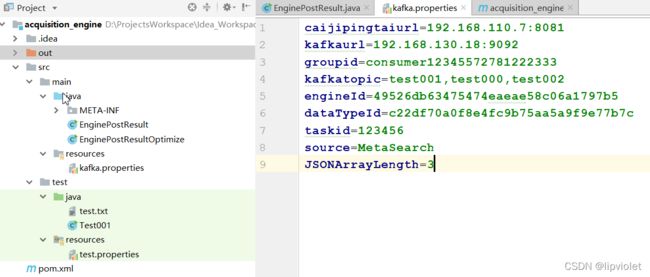
读取配置文件的话自然就是字节写,因为maven不会自动帮你自动添加配置文件
public static void postValue() throws Exception {
Properties pro = new Properties();
InputStream in = new BufferedInputStream(new FileInputStream("src/main/resources/kafka.properties"));
pro.load(in);
//InputStream in = getClass().getResourceAsStream("kafka.properties");
//InputStream in = getCjava.class.getClassLoader().getResourceAsStream("jdbcInfo.properties");
pro.put("key.deserializer",
"org.apache.kafka.common.serialization.StringDeserializer");
pro.put("value.deserializer",
"org.apache.kafka.common.serialization.StringDeserializer");
pro.put("bootstrap.servers", pro.getProperty("kafkaurl"));
pro.put("group.id", pro.getProperty("groupid"));
pro.put("auto.offset.reset", "earliest");
pro.put("auto.commit.offset","false");
KafkaConsumer<String, String> consumer = new KafkaConsumer<String, String>(pro);
String [] topicarr = pro.getProperty("kafkatopic").split(",");
consumer.subscribe(Arrays.asList(topicarr));
//consumer.subscribe(Collections.singletonList(pro.getProperty("kafkatopic")));
int length = Integer.parseInt(pro.getProperty("JSONArrayLength"));
JSONObject [] arr = new JSONObject[length];
int num = 0;
try {
while (true) {
ConsumerRecords<String, String> records =
consumer.poll(Duration.ofMillis(1000));
for (ConsumerRecord<String, String> record : records) {
String topic = record.topic();
String value = record.value();
arr[num] = JSONObject.parseObject(value);
num++;
if(num==length){
JSONObject json = new JSONObject();
json.put("total",length);
json.put("data", arr);
System.out.println(json);
PostResult(pro,json);
System.out.println(json);
num =0;
}
}
consumer.commitAsync();
}
} catch (Exception a) {
System.out.println(a);
}finally {
try {
consumer.commitSync();
} finally {
consumer.close();
}
}
}
3.1.2. springboot项目
springboot项目会自动加载配置文件,只要你放在resources文件夹下,并按规范命名为application.properties
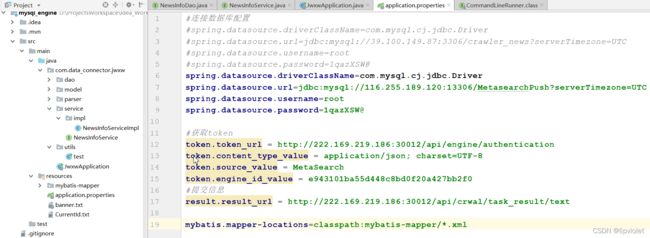
3.2. application.yml
-
简介
YML 文件格式是 YAML(YAML Aint Markup Language) 编写的文件格式,YAML 是一种直观的能够被电脑识别的的数据数据序列化格式,并且容易被人类阅读,容易和脚本语言交互的,可以被支持 YAML 库的不同的编程语言程序导入,比如: C/C++,Ruby,Python,Java,Perl,C#,PHP 等。YML 文件是以数据为核心的,比传统的 xml 方式更加简洁。YML 文件的扩展名可以使用 .yml 或者 .yaml。
这种格式只有springboot中可以使用,不知道普通maven项目中能否这样使用,以后有空可以试一下~ -
语法
☞ 约定
① 大小写敏感
② k: v 表示键值对关系,冒号后面必须有一个空格
③ 缩进时不允许使用 Tab 键,只允许使用空格
④ 使用空格的缩进表示层级关系,空格数目不重要,只要是左对齐的一列数据,都是同一个层级的
⑤ 松散表示,java 中对于驼峰命名法,可用原名或使用 - 代替驼峰,如 java 中的 userName 属性,在 yml 中使用 userName 或 user-name 都可正确映射☞ 普通值
字符串默认不用加上单引号或者双绰号;双引号:不会转义字符串里面的特殊字符;特殊字符会作为本身想表示的意思;单引号:会转义特殊字符,特殊字符最终只是一个普通的字符串数据name1: zhangsan name2: 'zhangsan \n lisi' name3: "zhangsan \n lisi" age: 18 flag: true☞ 日期
date: 2020/7/28☞ 对象(属性和值)
people: name: zhangsan age: 20☞ Map(键值对)
people: {name:zhangsan, age: 20}☞ 数组、list、set
# 用 - 表示数组中的一个元素, - 和 value 之间存在空格 city: - beijing - tianjin - shanghai - chongqing # 或者 city: [beijing, tianjin, shanghai, chongqing] # 集合中的元素是对象形式 student: - name: zhangsan age: 18 score: 100 - name: lisi age: 28 score: 88 - name: wangwu age: 38 score: 90 -
文档块
对于测试环境,开发环境,生产环境可以使用不同的配置,如果只想写到一个文件中,yml 与是支持的,使用用 — 隔开,称之为文档块。过 yml 文件构建多文档块,区分不同环境配置,自由切换不同环境启动项目,一个配置文件搞定。也就是说根本没必要建那么多配置文件夹
# 这里可以配置 MySQL 等环境 spring: profiles: # 选择哪一个环境的配置 active: dev # 使用 --- 划分文档块 --- server: port: 8081 spring: profiles: test --- server: port: 8082 spring: profiles: dev --- server: port: 8083 spring: profiles: prod
3.3. yml和properties共存
- 在 resources 中写一个 properties 文件和一个 yml 文件,然后分别再两个文件中写入不同名称的数据,最后写一个 controller 将两个文件中的数据读取返回。可以发现两个文件中的数据都读取到了,所以两个配置文件均生效,不会只读取一个配置文件。
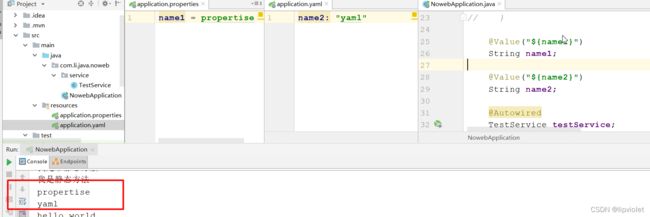
- 如果两个配置文件中出现同名的配置呢?修改一下配置文件,重新请求发现返回的是 properties 的配置。如果同一个目录下,有 application.yml 也有 application.properties,默认先读取 application.properties。如果同一个配置属性,在多个配置文件都配置了,默认使用第 1 个读取到的,后面读取的不覆盖前面读取到的。
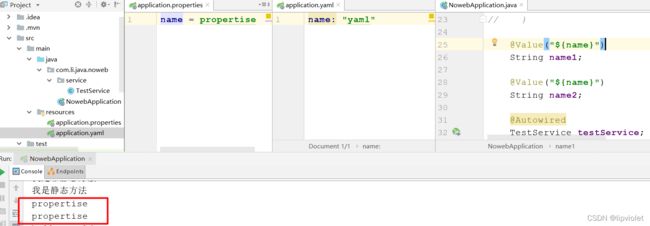
- 总结:
3.1. 配置文件的读取方式@Value(“${value}”)
3.2. 配置文件的命名为propertise、yaml、yml之一,可并存
3.3. 多种命名的配置并存时存在同名配置项,propertise优先级最高
3.4. 一种命名的配置文件并存时若存在同名配置项,没有优先级,取第一次读取到的,看个文件靠前。
3.4. 配置文件的位置
从官方文档中可以发现还有其他位置可以放配置文件,SpringBoot 配置文件默认可以放到以下目录中,可以自动读取到
♞ 项目根目录下
♞ 项目根目录中 config 目录下
♞ 项目的 resources 目录下
♞ 项目 resources 目录中 config 目录下
该列表按优先级排序(在列表较高位置定义的属性会覆盖在较低位置定义的属性),这些仅作为了解内容,在开发中配置文件一般都会在项目的 resources 目录下。
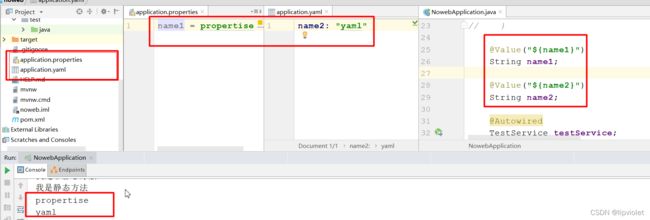

3.5. 获取配置属性
-
使用注解 @Value 映射
由于 Spring Boot 源自 Spring ,所以 Spring 中存在的属性注入,在 Spring Boot 中一样也存在。我们可以通过 @Value 注解将配置文件中的值映射到一个 Spring 管理的 Bean 的字段上。

-
使用注解 @ConfigurationProperties 映射
Spring Boot 引入了类型安全的属性注入,如果采用 Spring 中的配置方式,当配置的属性非常多的时候,工作量就很大了,而且容易出错。使用类型安全的属性注入,可以有效的解决这个问题。通过注解 @ConfigurationProperties(prefix=“配置文件中的 key 的前缀”) 可以将配置文件中的配置自动与实体进行映射。但是要注意使用 @ConfigurationProperties 方式可以进行配置文件与实体字段的自动映射,但需要字段必须提供 set 方法才可以,而使用 @Value 注解修饰的字段不需要提供 set 方法。
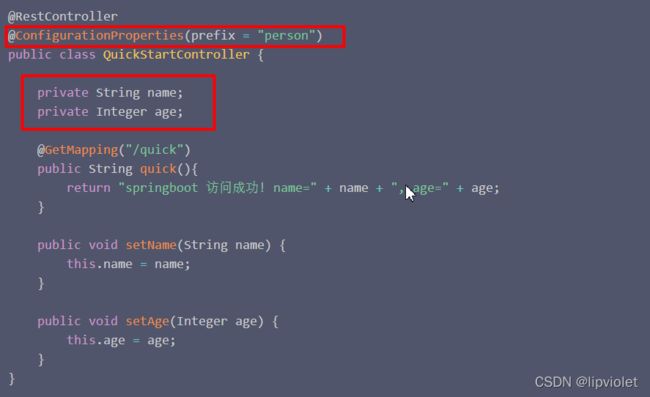
3.6. 配置文件值注入
配置文件
person:
lastName: hello
age: 18
boss: false
birth: 2017/12/12
maps: {k1: v1,k2: 12}
lists:
- lisi
- zhaoliu
dog:
name: 小狗
age: 12
javaBean:
/** * 将配置文件中配置的每一个属性的值,映射到这个组件中 * @ConfigurationProperties:告诉SpringBoot将本类中的所有属性和配置文件中相关的配置进行绑定; * prefix = "person":配置文件中哪个下面的所有属性进行一一映射 * * 只有这个组件是容器中的组件,才能容器提供的@ConfigurationProperties功能; * */ @Component @ConfigurationProperties(prefix = "person") public class Person {private String lastName; private Integer age; private Boolean boss; private Date birth; private Map<String,Object> maps; private List<Object> lists; private Dog dog;
我们可以导入配置文件处理器,以后编写配置就有提示了
org.springframework.boot
spring-boot-configuration-processor
true
①在springboot单元测试中,bean对象注入失败的问题
我的单元测试里面显示bean对象注入失败,我们都知道spring中使用注解会在spring配置文件中开启扫描注解的方法,springmvc也是一样,那么spring-boot也会提供一个扫描注解的方法叫做@ComponentScan(basePackages = {"com.bdqn.Controller"}),表示会扫描到basePackages中所有约定包下面的所有注解
后来经研究发现,SpringBoot项目的Bean装配默认规则是根据Application类所在的包位置从上往下扫描!“Application类”是指SpringBoot项目入口类。这个类的位置很关键:
如果Application类所在的包为:io.github.gefangshuai.app,则只会扫描io.github.gefangshuai.app包及其所有子包,如果service或dao所在包不在io.github.gefangshuai.app及其子包下,则不会被扫描!
本次测试的是yml配置文件映射动态绑定到实体类中,但是在单元测试类中出现bean对象扫描失败
这里给大家说明两点要注意的地方:
①测试文件的项目名称要和启动类的项目名称保持一致
②扫描注解只有放在启动类上面才会起到扫描bean对象的作用
实现步骤如下
/***
* 将配置文件中配置的每一个值映射到这个组件中
* * @ConfigurationProperties:告诉SpringBoot将本类中的所有属性和配置文件中相关的配置进行绑定;
* * prefix = "person":配置文件中哪个下面的所有属性进行一一映射
* *
* * 只有这个组件是容器中的组件,才能容器提供的@ConfigurationProperties功能;
* *
* */
@Component //把实体类注入容器
@ConfigurationProperties(prefix = "person")
public class Person {
// alt+insert
private String lastName;
private Integer age;
private Boolean boss;
private Date birth;
private Map<String,Object> maps;
private List<Object> lists;
private Dog dog;
###aplication.yml配置文件
person:
lastName: hello
age: 18
boss: false
birth: 2017/12/12
maps: {k1: v1,k2: 12}
lists:
- lisi
- zhaoliu
dog:
name: 小狗
age: 12
springboot启动类
@SpringBootApplication
@ComponentScan(basePackages = {"com.bdqn"})
/**
* 当测试启动类和Controller不位于同一个包下面时候需要
* 配置@ComponentScan(basePackages = {"com.bdqn.Controller"})去扫描controller的路径
*/
public class SpringBootQuickApplication {
public static void main(String[] args) {
SpringApplication.run(SpringBootQuickApplication.class, args);
}
}
在springboot提供的单元测试类里面进行测试
启动单元测试类,拿到了application.yml文件中配置的值
②@Value获取值和@ConfigurationProperties获取值比较
配置文件yml还是properties他们都能获取到值;
如果说,我们只是在某个业务逻辑中需要获取一下配置文件中的某项值,使用@Value;
测试代码如下
application.properties文件,实体类的代码还是不变
##修改spring-boot给我们底层的默认配置
#默认是的的是utf-8
#配置person的值
person.last-name=tom
person.age=18
person.boss=true
person.birth=2017/10/1
person.maps.k1=v1
person.maps.k2=v2
person.lists=a,b,c
person.dog.name=dog
person.dog.age=15
@RestController
/**
* 相当于 Contoller和RequestBody的合体,都是把数据响应给浏览器
*/
@RequestMapping("/test")
public class HelloController {
@Value("${person.last-name}")
private String name;
@RequestMapping("/hello")
public String hello(){
return "hello you name is"+name;
}
}
③配置文件注入值数据校验
@Component
@ConfigurationProperties(prefix = "person")
@Validated //专门验证数据的格式是否正确
public class Person {
/**
*
*
//lastName必须是邮箱格式
@Email
//@Value("${person.last-name}")
private String lastName;
//@Value("#{11*2}")
private Integer age;
//@Value("true")
private Boolean boss;
private Date birth;
private Map<String,Object> maps;
private List<Object> lists;
private Dog dog;
④@PropertySource&@ImportResource&@Bean
/**
* 将配置文件中配置的每一个属性的值,映射到这个组件中
* @ConfigurationProperties:告诉SpringBoot将本类中的所有属性和配置文件中相关的配置进行绑定;
* prefix = "person":配置文件中哪个下面的所有属性进行一一映射
*
* 只有这个组件是容器中的组件,才能容器提供的@ConfigurationProperties功能;
* @ConfigurationProperties(prefix = "person")默认从全局配置文件中获取值;
*
*/
@PropertySource(value = {"classpath:person.properties"})
@Component
@ConfigurationProperties(prefix = "person")
//@Validated
public class Person {
/**
*
*
//lastName必须是邮箱格式
// @Email
//@Value("${person.last-name}")
private String lastName;
//@Value("#{11*2}")
private Integer age;
//@Value("true")
private Boolean boss;
@ImportResource:导入Spring的配置文件,让配置文件里面的内容生效;
Spring Boot里面没有Spring的配置文件,我们自己编写的配置文件,也不能自动识别;
想让Spring的配置文件生效,加载进来;@ImportResource标注在一个启动Application配置类上,ApplicationContext.xml
单元测试类代码如下,不加入@ImportResource情况下
@Test
public void TestService(){
//测试容器中是否有这个值
Boolean bean= (Boolean) ioc.containsBean("helloService");
System.out.println(bean);
}
@SpringBootApplication
@ComponentScan(basePackages = {"com.bdqn"})
//引入spring的配置文件
@ImportResource(locations = {"classpath:ApplicationContext.xml"})
/**
* 当测试启动类和Controller不位于同一个包下面时候需要
* 配置@ComponentScan(basePackages = {"com.bdqn.Controller"})去扫描controller的路径
*/
public class SpringBootQuickApplication {
public static void main(String[] args) {
SpringApplication.run(SpringBootQuickApplication.class, args);
}
}
不用编写Spring的配置文件SpringBoot推荐给容器中添加组件的方式;推荐使用全注解的方式,但是我觉得太麻烦了,每次创建一个bean都要创建一个类对象
1、配置类@Configuration------>Spring配置文件
2、使用@Bean给容器中添加组件
/**
* @Configuration:指明当前类是一个配置类;就是来替代之前的Spring配置文件
*
* 在配置文件中用⑤配置文件占位符
1、随机数
${random.value}、${random.int}、${random.long}
${random.int(10)}、${random.int[1024,65536]}
2、占位符获取之前配置的值,如果没有可以是用:指定默认值
person.last-name=张三${random.uuid}
person.age=${random.int}
person.birth=2017/12/15
person.boss=false
person.maps.k1=v1
person.maps.k2=14
person.lists=a,b,c
//前面有person.maps这个值,后面person.dog.name想用一下前面的值
person.dog.name=${person.maps:hello}_dog
person.dog.age=15
四、Profile
是springboot用来做多环境支持的,开发环境、测试环境、运行环境
①、多Profile文件
我们在主配置文件编写的时候,文件名可以是 application-{profile}.properties/yml
默认使用application.properties的配置;
②、yml支持多文档块方式
server:
port: 8081
spring:
profiles:
active: prod
---//三个横线+回车
server:
port: 8083
spring:
profiles: dev
---
server:
port: 8084
spring:
profiles: prod #指定属于哪个环境
⑥激活指定profile
1、在application.properties配置文件中指定 spring.profiles.active=dev
2、命令行:
java -jar spring-boot-02-config-0.0.1-SNAPSHOT.jar --spring.profiles.active=dev;
可以直接在测试的时候,配置传入命令行参数
3、虚拟机参数;
-Dspring.profiles.active=dev
五、配置文件加载位置或顺序
springboot 启动会扫描以下位置的application.properties或者application.yml文件作为Spring boot的默认配置文件
–file:./config/
–file:./
–classpath:/config/
–classpath:/
入图上所展示,优先级由高到底,高优先级的配置会覆盖低优先级的配置;
SpringBoot会从这四个位置全部加载主配置文件;互补配置;
==我们还可以通过spring.config.location来改变默认的配置文件位置==
项目打包好以后,我们可以使用命令行参数的形式,启动项目的时候来指定配置文件的新位置;指定配置文件和默认加载的这些配置文件共同起作用形成互补配置;
先输入 cd target
在输出dir
输入:java -jar spring-boot-02-config-02-0.0.1-SNAPSHOT.jar
--spring.config.location=F:/application.properties(里面是湍口号内容)也可以运行项目
3.7. 外部配置加载顺序
==SpringBoot也可以从以下位置加载配置;优先级从高到低;高优先级的配置覆盖低优先级的配置,所有的配置会形成互补配置==
1.命令行参数
所有的配置都可以在命令行上进行指定
java -jar spring-boot-02-config-02-0.0.1-SNAPSHOT.jar --server.port=8087 --server.port=8087
--server.context-path=/abc //访问项目名称,但是需要修改多个配置的时候这么写的话?显得很累赘
可以专门写一个外部配置文件
多个配置用空格分开;--配置项=值
2.来自java:comp/env的JNDI属性
3.Java系统属性(System.getProperties())
4.操作系统环境变量
5.RandomValuePropertySource配置的random.*属性值
==由jar包外向jar包内进行寻找;==
==优先加载带profile==
优先加载,外部jar包旁边的配置文件
6.jar包外部的application-{profile}.properties或application.yml(带spring.profile)配置文件**
7.jar包内部的application-{profile}.properties或application.yml(带spring.profile)配置文件
==再来加载不带profile==
8.jar包外部的application.properties或application.yml(不带spring.profile)配置文件
9.jar包内部的application.properties或application.yml(不带spring.profile)配置文件
10.@Configuration注解类上的@PropertySource
11.通过SpringApplication.setDefaultProperties指定的默认属性
所有支持的配置加载来源;
3.8. 自动配置原理
配置文件到底能写什么?怎么写?自动配置原理;
配置文件能配置的属性参照
1、自动配置原理:
1)、SpringBoot启动的时候加载主配置类,开启了自动配置功能 ==@EnableAutoConfiguration==
2)、@EnableAutoConfiguration 作用:
利用EnableAutoConfigurationImportSelector给容器中导入一些组件?
可以查看selectImports()方法的内容;
Listconfigurations = getCandidateConfigurations(annotationMetadata, attributes); 获取候选的配置
SpringFactoriesLoader.loadFactoryNames()
扫描所有jar包类路径下 META-INF/spring.factories
把扫描到的这些文件的内容包装成properties对象
从properties中获取到EnableAutoConfiguration.class类(类名)对应的值,然后把他们添加在容器中
==将 类路径下 META-INF/spring.factories 里面配置的所有EnableAutoConfiguration的值加入到了容器中;==
3)、每一个自动配置类进行自动配置功能;
4)、以HttpEncodingAutoConfiguration(Http编码自动配置)为例解释自动配置原理;
@Configuration //表示这是一个配置类,以前编写的配置文件一样,也可以给容器中添加组件
@EnableConfigurationProperties(HttpEncodingProperties.class) //启动指定类的ConfigurationProperties功能;将配置文件中对应的值和HttpEncodingProperties绑定起来;并把HttpEncodingProperties加入到ioc容器中
@ConditionalOnWebApplication //Spring底层@Conditional注解(Spring注解版),根据不同的条件,如果满足指定的条件,整个配置类里面的配置就会生效;判断当前应用是否是web应用,如果是,当前配置类生效
@ConditionalOnClass(CharacterEncodingFilter.class) //判断当前项目有没有这个类CharacterEncodingFilter;SpringMVC中进行乱码解决的过滤器;
@ConditionalOnProperty(prefix = "spring.http.encoding", value = "enabled", matchIfMissing = true) //判断配置文件中是否存在某个配置 spring.http.encoding.enabled;如果不存在,判断也是成立的
//即使我们配置文件中不配置pring.http.encoding.enabled=true,也是默认生效的;
public class HttpEncodingAutoConfiguration {
//他已经和SpringBoot的配置文件映射了
private final HttpEncodingProperties properties;
//只有一个有参构造器的情况下,参数的值就会从容器中拿
public HttpEncodingAutoConfiguration(HttpEncodingProperties properties) {
this.properties = properties;
}
@Bean //给容器中添加一个组件,这个组件的某些值需要从properties中获取
@ConditionalOnMissingBean(CharacterEncodingFilter.class) //判断容器没有这个组件?
public CharacterEncodingFilter characterEncodingFilter() {
CharacterEncodingFilter filter = new OrderedCharacterEncodingFilter();
filter.setEncoding(this.properties.getCharset().name());
filter.setForceRequestEncoding(this.properties.shouldForce(Type.REQUEST));
filter.setForceResponseEncoding(this.properties.shouldForce(Type.RESPONSE));
return filter;
}
根据当前不同的条件判断,决定这个配置类是否生效?
一但这个配置类生效;这个配置类就会给容器中添加各种组件;这些组件的属性是从对应的properties类中获取的,这些类里面的每一个属性又是和配置文件绑定的;5)、所有在配置文件中能配置的属性都是在xxxxProperties类中封装;配置文件能配置什么就可以参照某个功能对应的这个属性类
@ConfigurationProperties(prefix = "spring.http.encoding") //从配置文件中获取指定的值和bean的属性进行绑定
public class HttpEncodingProperties {
public static final Charset DEFAULT_CHARSET = Charset.forName("UTF-8");
精髓:springboot里面的HttpEncodingProperties会自动配置好很多注组件
1)、SpringBoot启动会加载大量的自动配置类
2)、我们看我们需要的功能有没有SpringBoot默认写好的自动配置类;
3)、我们再来看这个自动配置类中到底配置了哪些组件;(只要我们要用的组件有,我们就不需要再来配置了)
4)、给容器中自动配置类添加组件的时候,会从properties类中获取某些属性。我们就可以在配置文件中指定这些属性的值;
xxxxAutoConfigurartion:自动配置类;
给容器中添加组件
xxxxProperties:封装配置文件中相关属性;
2、细节
1、@Conditional派生注解(Spring注解版原生的@Conditional作用)
作用:必须是@Conditional指定的条件成立,才给容器中添加组件,配置配里面的所有内容才生效;
自动配置类必须在一定的条件下才能生效;
我们怎么知道哪些自动配置类生效;
==我们可以通过启用 在全局配置文件aplication.properties中开启 debug=true属性;来让控制台打印自动配置报告==,这样我们就可以很方便的知道哪些自动配置类生效;
#开启Springboot中的debug
debug=true
#配置端口号
server.port=8089
#我们能配置那些都是来源于properties类
spring.http.encoding.enabled=true
spring.http.encoding.charset=utf-8
spring.http.encoding.force=true
=========================
AUTO-CONFIGURATION REPORT
=========================
Positive matches:(自动配置类启用的)
-----------------
DispatcherServletAutoConfiguration matched:
- @ConditionalOnClass found required class 'org.springframework.web.servlet.DispatcherServlet'; @ConditionalOnMissingClass did not find unwanted class (OnClassCondition)
- @ConditionalOnWebApplication (required) found StandardServletEnvironment (OnWebApplicationCondition)
Negative matches:(没有启动,没有匹配成功的自动配置类)
-----------------
ActiveMQAutoConfiguration:
Did not match:
- @ConditionalOnClass did not find required classes 'javax.jms.ConnectionFactory', 'org.apache.activemq.ActiveMQConnectionFactory' (OnClassCondition)
AopAutoConfiguration:
Did not match:
- @ConditionalOnClass did not find required classes 'org.aspectj.lang.annotation.Aspect', 'org.aspectj.lang.reflect.Advice' (OnClassCondition)
